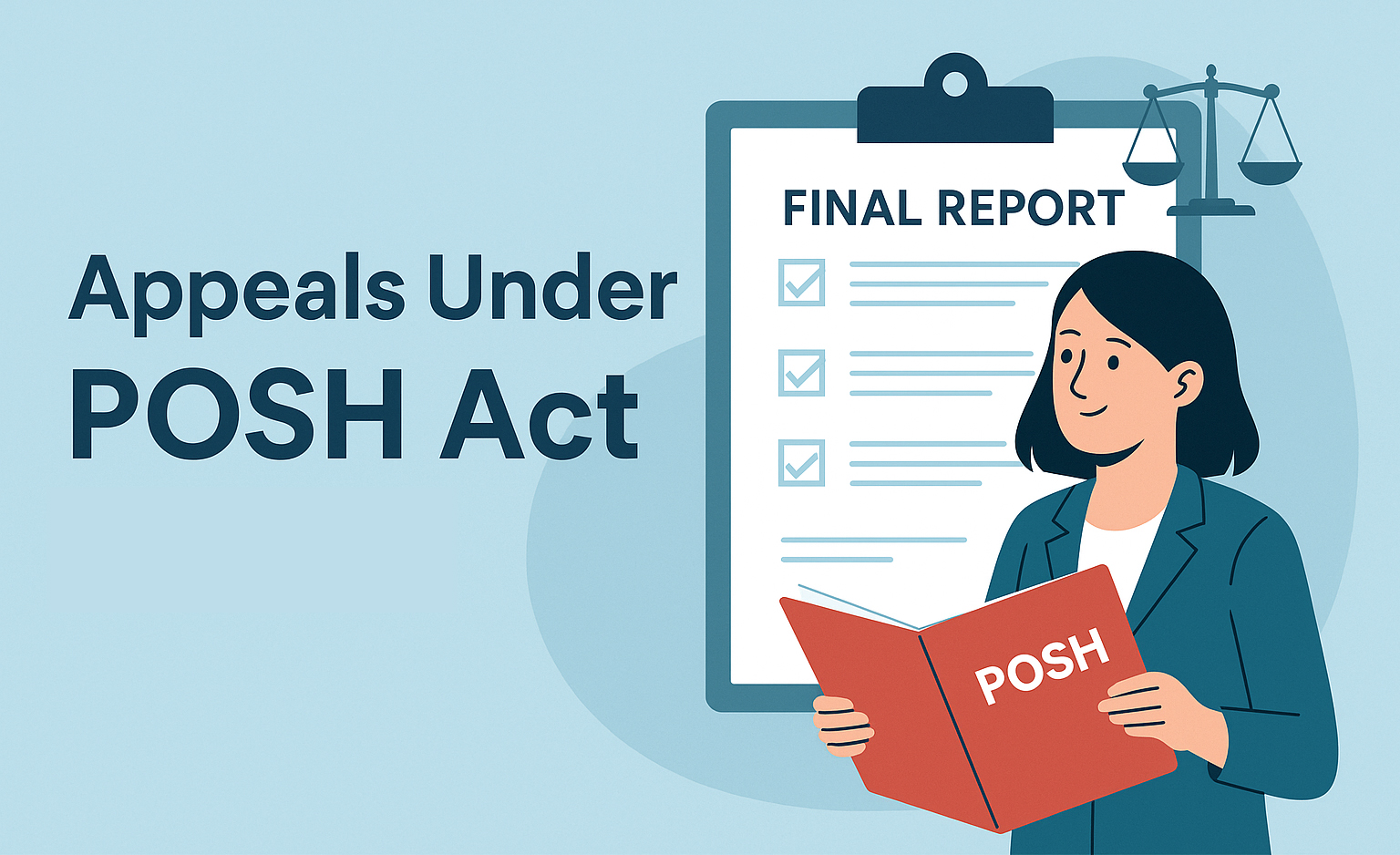
3. Limitation Period to File an Appeal
4. Can Private Organisations Have An Internal Appeal Process?
5. Can Internal Appellate Body Overrule The Findings Of IC?
6. Is Having an Internal Appellate Body mandatory?
7. Who can be on Internal Appellate Body?
Introduction
Once the proceedings are concluded and the Internal Committee (IC) prepares its final report, a copy is shared with the complainant, the respondent, and the employer.
The employer then has 60 days to implement the IC’s recommendations. Meanwhile, if either party to the proceedings is aggrieved by the IC’s decision, they can challenge it before the Appellate Authority by way of appeal.
Section 18 of the POSH Act, read with Rule 11 of the POSH Rules, 2013, governs appeals and the appellate mechanism. While, this statutory framework defines the right to appeal, it often raises practical doubts in workplace settings.
This blog examines such practical issues in detail and provides clarity on the scope and limitations of appeals under the POSH Act.
Note: The appeal and appellate mechanism may vary depending on the organisation’s internal policies and Code of Conduct. This is a general analysis of the provisions of law and should not be construed as legal advice. Please consult a qualified legal professional for specific guidance.
Appeals Under POSH Act
Section 18 of the POSH Act allows any aggrieved party to file an appeal against the recommendations of IC. The Act states that the appeal must be made in accordance with the employer’s service rules. Where such service rules exist, the authority named in those rules will act as the appellate authority.
If no service rules exist, then Rule 11 of the POSH Rules, 2013 clarifies that an appeal may be filed before the appellate authority notified under the Industrial Employment (Standing Orders) Act, 1946. The State Government or the Central Government has the power to appoint such authorities. This provision is applicable to industrial establishments with 50 or more employees.
If neither service rules nor standing orders apply, the aggrieved party may challenge the IC’s decision by filing a writ petition before the jurisdictional High Court.
Limitation Period To File An Appeal
Section 18 of the POSH Act provides that an appeal must be filed within 90 (ninety days) from the date of the IC’s recommendations.
Can Private Organisations Have An Internal Appeal Process?
Section 18 states that when service rules apply, the appellate authority is the one mentioned in those rules. A key ambiguity arises because the POSH Act does not define the term “service rules.”
While government bodies are governed by well-defined central or state service rules, it is unclear whether a private organisation’s internal policies such as its Code of Conduct, disciplinary policy, or POSH policy can qualify as service rules and allow it to establish an internal appellate body for the purpose of Section 18.
Despite this uncertainty, there is no legal prohibition on a private organisation creating an internal review or appeal mechanism. An employer may set up its own internal appellate body to examine and review the recommendations of the IC, but only to check whether the inquiry was conducted according to the procedure laid down under the POSH Act and as per the principles of natural justice.
If the internal appellate body limits itself to reviewing the procedural fairness of the IC inquiry and does not replace the IC’s findings on the merits, the arrangement is lawful and can strengthen the integrity of the process.
Key considerations when setting up an internal appeal process
1. No restriction on statutory right
An internal appeal cannot override or limit the employee’s statutory right to approach an external forum such as a court or tribunal under Section 18 and Rule 11. An employee dissatisfied after using the internal process still retains the right to file an appeal before the external appellate authority.
2. Scope of internal appeal
The internal appellate body should restrict its role to reviewing procedural fairness and compliance with inquiry requirements. It should not have the power to nullify the IC’s findings on the merits in a way that conflicts with the employer’s statutory duty to implement the IC’s recommendations.
3. Timelines
Organisations can set timelines for internal appeals, such as requiring appeals to be filed and decided within 30 to 45 days. This ensures employees still have enough time to file an external appeal to a court or tribunal within the statutory period of ninety days.
4. Purpose is not to avoid implementation
Employers must remember that the internal appellate body is only an additional channel to review procedural fairness. It cannot be used to delay or avoid implementing the IC’s recommendations.
Can The Internal Appellate Body Overrule The IC?
An internal appellate body should not replace or overrule the IC’s findings on the merits of the complaint. Its role is limited to ensuring the inquiry followed due process. This includes checking whether the parties were given a fair opportunity to be heard, had access to evidence, could cross-examine witnesses, and whether there was any conflict of interest among IC members.
If the appellate body finds that there has been a serious procedural lapse leading to a miscarriage of justice, it may remit the matter back to the IC to correct the lapse. For example, if the respondent was not given an opportunity to cross-examine witnesses, the IC can provide that opportunity and then issue fresh findings.
Is Having An Internal Appeal Process Mandatory?
No. The POSH Act does not require private organisations to create an internal appellate body. It is entirely optional. However, it is often advisable. An internal appellate body can act as an additional review mechanism, similar to a disciplinary authority under central or state service rules, to verify whether the inquiry complied with the principles of natural justice.
When the IC recommends serious penalties, employers may find it challenging to implement those recommendations without first checking if the inquiry was fair. If the recommendations are implemented without any review, they may be challenged in court. An internal appellate body helps reduce this risk and can make implementation decisions more justifiable.
Government employers already have a structured framework under central or state service rules. Once the IC submits its report, the disciplinary authority issues a show-cause notice, frames charges if necessary, and gives the party facing action an opportunity to respond. If the complaint is found to be malicious or false, the complainant is also given a chance to present a representation. After hearing the concerned party, the disciplinary authority may:
- Concur with the IC’s findings and impose appropriate penalties.
- Disagree with the IC’s findings, record reasons in writing, remit the matter back to the IC for further inquiry, or exonerate the respondent if justified.
A similar internal appellate process in private organisations benefits both sides. For the employer, it helps ensure fair and supportable implementation of the IC’s recommendations. For the employee, it provides a quicker and less expensive way to address procedural lapses before approaching the courts.
Who Can Be On The Internal Appellate Committee?
The POSH Act does not prescribe how an internal appellate body should be constituted.
If your organisation intends to create an Internal Appellate Committee, eLearnPOSH recommends the following:
- Form a committee of two to three members with balanced gender representation.
- Include a senior HR or other department representative who is impartial and mature in handling sensitive matters.
- Consider appointing one external member to promote fairness and transparency.
- Ensure that no members of the Internal Committee (IC) are included in the Internal Appellate Committee, as their participation would breach the principles of natural justice.



Leave a Reply